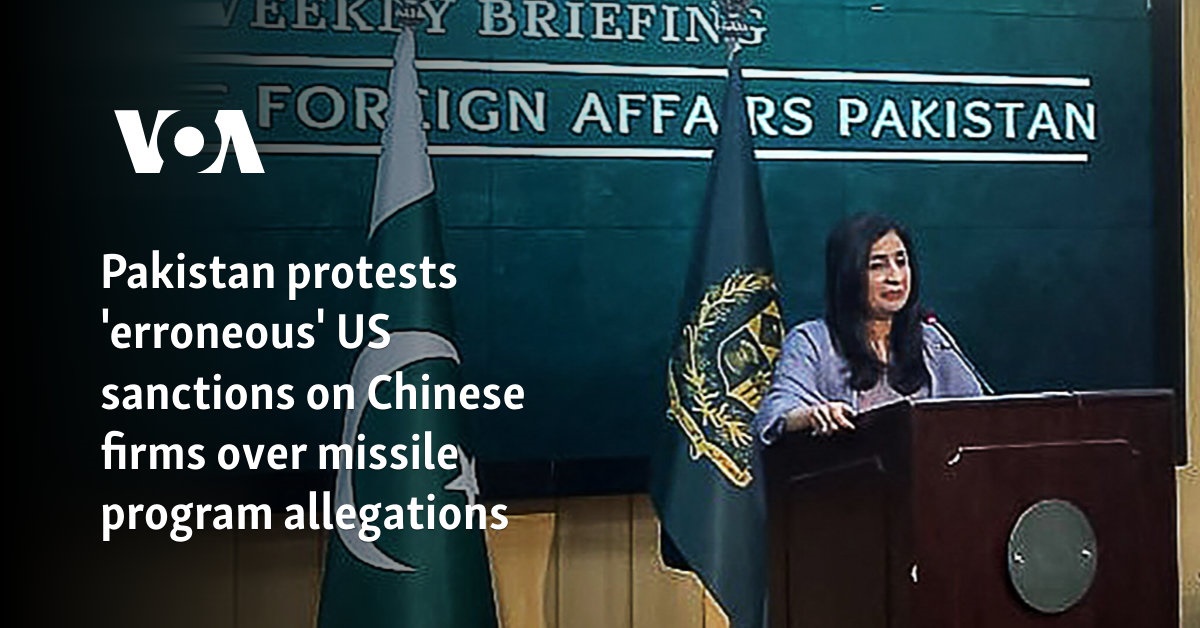
Pakistan on Saturday criticized the United States for punishing four international companies it accused of aiding its ballistic missile program.
“Pakistan rejects the use of export controls for political purposes,” foreign ministry spokesman Mumtaz Zahra Baloch said.
The reaction came a day after Washington imposed sanctions on three Chinese companies and one Belarusian company over their alleged links to Islamabad’s missile development program.
“These entities provided items suitable for missiles to Pakistan’s ballistic missile program, including its long-range missile program,” the State Department said on Friday.
The report notes that the sanctions are part of U.S. efforts to disrupt and target “proliferators of weapons of mass destruction and their delivery vehicles” and strengthen the global non-proliferation “regime.”
“Business entities have also been listed in the past for alleged links to Pakistan’s ballistic missile program, but no evidence has been shared,” Baloch said.
“We have repeatedly pointed out the need to avoid the arbitrary imposition of export controls and the need for relevant parties to discuss the establishment of objective mechanisms to avoid erroneous sanctions on technology purely needed for socio-economic development,” she added.
Baloch reiterated Islamabad’s readiness to discuss “end-use and end-user verification mechanisms so that legitimate commercial users are not harmed by discriminatory implementation of export controls”.
She claimed that Pakistan had experienced instances in the past of blacklisting foreign companies based solely on suspicion.
The United States identified suppliers for Islamabad’s ballistic missile program as China’s Xi’an Longde Science and Technology Development Co., Ltd., Tianjin Creative Source International Trading Co., Ltd., Grandpack Co., Ltd. and the Belarusian Minsk Wheel Tractor Factory.
Under the U.S. executive order, all assets, property and interests in property of sanctioned companies located in the United States or controlled by U.S. citizens must be frozen and reported to the Treasury Department’s Office of Foreign Assets Control (OFAC).
The list makes it illegal for any person or entity in the United States or any U.S. citizen to engage in any transaction involving the property or property interests of designated or blocked companies unless authorized by a specific or general license issued by OFAC or exempted.
Without naming the United States or any other country, Baloch said “the same jurisdictions” that claim to “strictly adhere” to the non-proliferation of weapons and military technology sometimes make exceptions and even waive licensing requirements “for certain countries” , to help them acquire advanced technology. Military equipment.
“Such discriminatory practices and double standards are undermining the credibility of the non-proliferation regime, exacerbating military asymmetries, and thus undermining the goals of regional and global peace and security,” she said. “This has led to an arms buildup (in the region).”
Balochistan is an apparent reference to Washington’s close military and nuclear cooperation with Pakistan’s archrival India. The nuclear-armed South Asian neighbors have fought three wars and a decades-old territorial dispute over Kashmir remains a major source of mutual tension.
Follow us on Google news ,Twitter , and Join Whatsapp Group of thelocalreport.in












